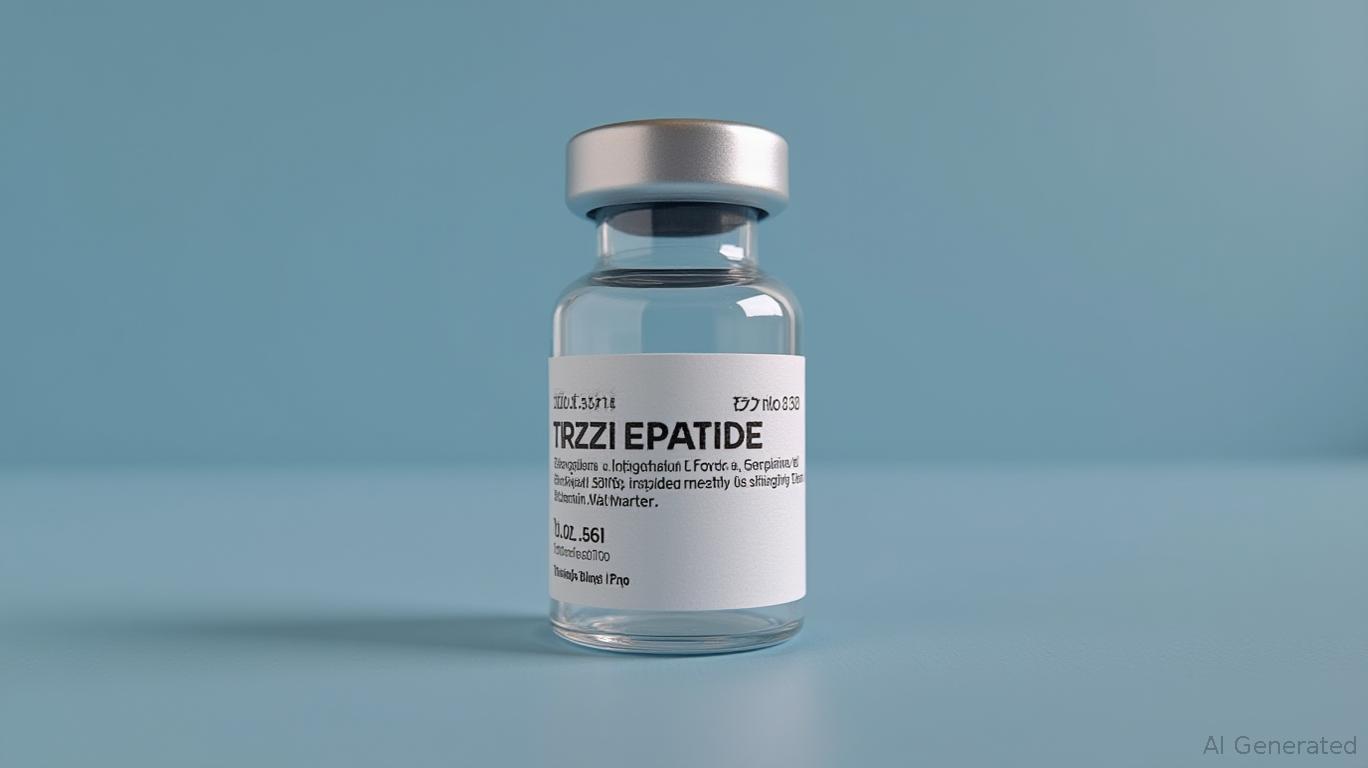Walmart and Lilly's Price Reduction Initiative Revolutionizes Access to Obesity Medications
- U.S. adult obesity rates declining drive demand for GLP-1 weight-loss drugs like Eli Lilly's Zepbound and Novo Nordisk's Wegovy. - Lilly-Walmart partnership slashes Zepbound prices by 50%+ via retail pharmacies, expanding access through direct-to-consumer model. - GLP-1 market surges 160% yearly in 2023-2024, projected to exceed $299B globally by 2033 due to dual diabetes-weight management efficacy. - Trump administration's price-cutting policies and retail partnerships reshape access, but high out-of-po
Obesity rates among adults in the United States have declined from previous highs, leading to increased interest in weight-loss medications and driving significant growth in the pharmaceutical sector. Major pharmaceutical companies, including
In October 2025, Eli Lilly and Walmart revealed that individuals with prescriptions could obtain single-dose Zepbound vials at discounts of 50% or more off the standard price through Walmart’s 4,600 pharmacies or via home delivery beginning mid-November. This partnership marks the debut of LillyDirect, Eli Lilly’s direct-to-consumer service, within a retail pharmacy network. The initiative is designed to make Zepbound more accessible, intensifying the competition between Eli Lilly and its main rival, Novo Nordisk, in the GLP-1 market, according to CNBC.

This alliance supports the Trump administration’s broader push to lower medication costs by encouraging direct-to-consumer approaches that bypass insurance intermediaries. With this model, patients pay a set fee—$349 monthly for the initial dose and $499 for higher doses—regardless of whether they choose home delivery or pick up in-store. Jennifer Mazur, who leads LillyDirect, highlighted that this program helps overcome obstacles to managing chronic illnesses, stating, "Addressing obesity comes with significant physical, emotional, and financial challenges. Our partnership with Walmart helps ease these challenges by simplifying access to prescribed therapies," as mentioned in a
Expanding Zepbound’s reach is a key part of Eli Lilly’s plan to lead the GLP-1 market. Direct-to-consumer purchases now represent over one-third of new Zepbound prescriptions, a milestone achieved after the introduction of cash discounts in August 2024. Meanwhile, Novo Nordisk is working with CVS and Caremark to distribute its rival drug, Wegovy. As the fifth-largest pharmacy chain in the country by prescription volume, Walmart plays a pivotal role in determining how patients access these treatments, CNBC reported.
The rapid expansion of the GLP-1 market is evident in industry statistics. Prescriptions for GLP-1 analogues in the U.S. jumped 160% from 2023 to 2024, and the global market is expected to surpass $299 billion by 2033, according to a
However, there are still hurdles to overcome. Eli Lilly’s direct-to-consumer approach has not fully resolved insurance coverage gaps, and the high costs for larger doses may still be a barrier for some. Additionally, the Trump administration’s "most favored nation" policy—which would tie U.S. drug prices to those in other countries—has yet to secure pricing deals with Eli Lilly, unlike agreements already made with Pfizer and AstraZeneca, CNBC stated.
Looking forward, the rivalry between Eli Lilly and Novo Nordisk is set to escalate. Novo Nordisk recently committed $4.1 billion to boost Wegovy’s global supply, while Eli Lilly is moving its triple-hormone agonist, "Retatrutide," into clinical testing, according to the PR Newswire release. The industry is also turning its attention to combination treatments and advanced delivery methods, with companies like Sanofi and AstraZeneca developing dual GLP-1/GIP analogues for metabolic conditions.
As the obesity epidemic continues to change, so does the pharmaceutical industry. The intersection of retail partnerships, regulatory changes, and ongoing innovation is transforming how patients receive vital treatments—and how industry leaders capture billions in revenue.
Disclaimer: The content of this article solely reflects the author's opinion and does not represent the platform in any capacity. This article is not intended to serve as a reference for making investment decisions.
You may also like
Bitcoin News Update: Bitcoin Eyes $200K Amid Market Fluctuations—BlockchainFX Presale Seeks to Leverage Opportunity
- Saylor and Kiyosaki advocate for Bitcoin's $200K target by 2025, citing accumulation trends and geopolitical stability. - BlockchainFX's $0.029 presale (targeting $0.05) attracts $10.4M+ in 15,700+ investors with 90% APY staking and Visa card utility. - Macroeconomic tailwinds (98.3% Fed cut probability) and institutional Bitcoin adoption (MicroStrategy's 3.5x growth) reinforce bullish sentiment. - Volatility risks persist: Bitcoin ETF outflows ($488M) contrast with strategic corporate accumulation and B
Democratic Anti-Crypto Legislation Ignites Partisan Clash Over Connections to Trump
- U.S. Democrats, led by Rep. Ro Khanna, introduced a bill to ban elected officials from crypto/NFTs and mandate asset disclosure, targeting Trump’s pro-crypto ventures. - The bill accuses Trump’s family of leveraging their influence to promote unregulated crypto projects, citing World Liberty Financial’s ties to Binance’s Zhao. - Partisan clashes intensify as Trump pardoned Zhao, boosting BNB/BNB, while New Hampshire’s crypto mining deregulation stalled over environmental concerns. - Senator Warren critic

Bitcoin News Update: Privacy-Focused Zcash Soars by 400% While Bitcoin Faces Broader Economic Challenges
- Zcash (ZEC) surged 400% in 30 days, hitting a seven-year high amid Bitcoin's $108,000 struggle due to macroeconomic pressures and geopolitical tensions. - Institutional interest and 4.5M ZEC locked in shielded pools drove ZEC's rally, reflecting growing demand for privacy-centric assets like the Grayscale Zcash Fund's $85M inflows. - Bitcoin faces headwinds from Fed rate cuts, U.S.-China trade dynamics, and Trump-era nuclear rhetoric, with technical indicators signaling oversold conditions below $110,000

Thodex CEO's Death in Prison Triggers Immediate Demands for Cryptocurrency Oversight Following $2.6 Billion Loss
- Faruk Fatih Özer, former CEO of collapsed Turkish crypto exchange Thodex, was found dead in prison while serving an 11,196-year sentence for orchestrating a $2.6B fraud. - His death reignited scrutiny over Thodex's 2021 collapse, which left thousands of investors with losses, prompting urgent calls for stricter crypto regulations in Turkey and globally. - Prosecutors alleged Özer siphoned $253M in crypto assets through fraudulent transactions, though initial loss estimates ($24M) starkly contrasted with